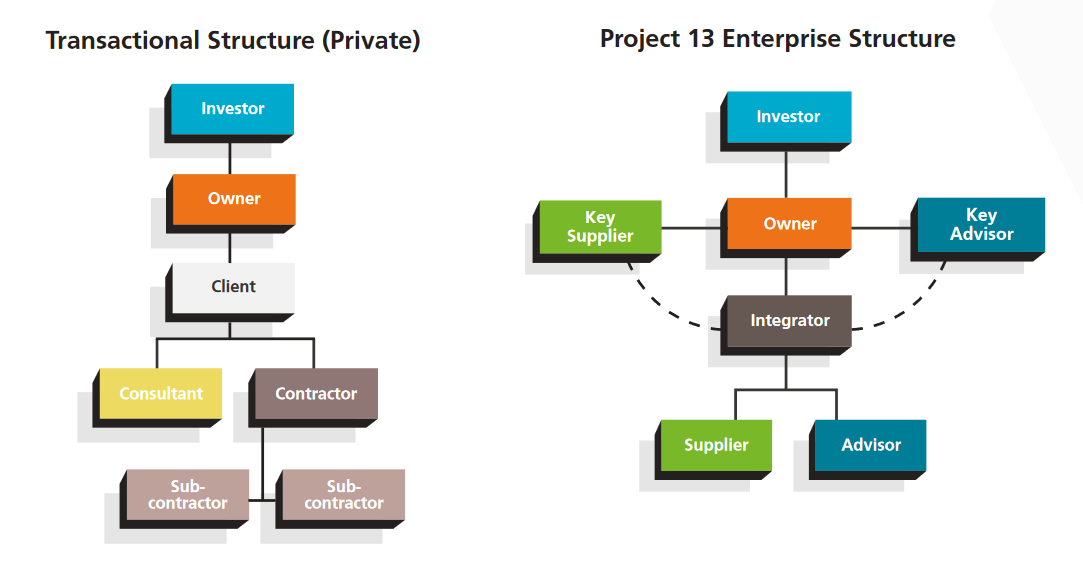Enterprise model for infrastructure
Project 13 is an Institution of Civil Engineers (ICE) - led initiative to boost certainty and productivity in the delivery of infrastructure, to improve whole-life outcomes and to support a more sustainable, innovative, highly-skilled industry. It is a response to a general perception that the infrastructure sector’s current operating model is broken, with projects delivered over budget, over time and below par.
Project 13 proposes an 'enterprise model' rather than a traditional construction programme model in which:
- The owner is central and leads the enterprise, defining long-term value.
- Suppliers and advisors have direct relationships with the owner.
- An ‘integrator’ actively engages and integrates all tiers of the market.
- The key suppliers, owner, advisor and integrator work as one team to optimise value.
ICE suggest that this is different from the traditional construction programme model in that:
- Reward is based on value added to the overall outcomes, not service provided.
- There is a greater understanding of cost drivers and risk across all organisations, with commercial incentives for collaboration to jointly mitigate risk, not transfer it.
- Establishing a high-performing enterprise requires fundamentally different leadership, governance, behaviours and skills to succeed. This is underpinned by organisations with increasingly diverse skills and backgrounds.
In this context, an enterprise is defined as:
‘… an integrated organisation, aligned and commercially incentivised to deliver better outcomes for customers from infrastructure investment. Such organisations are characterised by sophisticated, maturing and typically longer-term relationships between owners, investors, integrators, advisors and suppliers. The roles, capabilities and behaviours of an enterprise differ from those in much of the construction industry today and success will be underpinned by developing organisations with increasingly diverse backgrounds and skill sets.’
The enterprise is led by the owner who manages and operates the asset(s) and leads in identifying the needs of the asset(s) and promoting them to the investor. The investor is an enabler of the enterprise concerned with affordability, societal and financial benefits derived from optimal management of the asset(s).
The owner has a direct relationship with the suppliers and advisors, facilitated by the integrator. The integrator brings in appropriate suppliers and advisors when they can best add value.
The suppliers and advisors are experts in their subject area, accountable for delivery of specific aspects of the enterprise.
Ref: P13 Blueprint, Institution of Civil Engineers, May 2018.
[edit] Find out more
[edit] Related articles on Designing Buildings Wiki
Featured articles and news
Infrastructure that connect the physical and digital domains.
Harnessing robotics and AI in challenging environments
The key to nuclear decommissioning and fusion engineering.
BSRIA announces Lisa Ashworth as new CEO
Tasked with furthering BSRIA’s impressive growth ambitions.
Public buildings get half a million energy efficiency boost
£557 million to switch to cleaner heating and save on energy.
CIOB launches pre-election manifesto
Outlining potential future policies for the next government.
Grenfell Tower Inquiry announcement
Phase 2 hearings come to a close and the final report due in September.
Progress from Parts L, F and O: A whitepaper, one year on.
A replicated study to understand the opinion of practitioners.
ECA announces new president 2024
Electrical engineer and business leader Stuart Smith.
A distinct type of countryside that should be celebrated.
Should Part O be extended to existing buildings?
EAC brands heatwave adaptation a missed opportunity.
Definition of Statutory in workplace and facilities management
Established by IWFM, BESA, CIBSE and BSRIA.
Tackling the transition from traditional heating systems
59% lack the necessary information and confidence to switch.
The general election and the construction industry
As PM, Rishi Sunak announces July 4 date for an election.
Eco apprenticeships continue help grow green workforce
A year after being recognised at the King's coronation.
Permitted development rights for agricultural buildings
The changes coming into effect as of May 21, 2024.






















